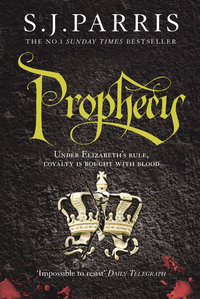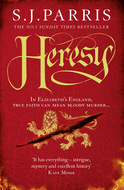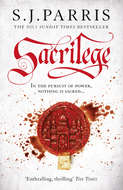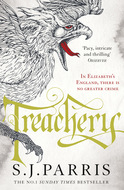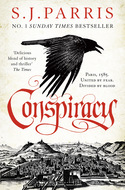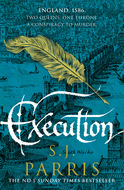Kitap dosya olarak indirilemez ancak uygulamamız üzerinden veya online olarak web sitemizden okunabilir.
Kitabı oku: «Prophecy», sayfa 2
‘I have befriended the ambassador’s clerk, your honour. For the right price, he says he can give us access to every letter Castelnau writes and receives, if you will guarantee that the documents will bear no evidence of tampering. He is greatly afraid of being discovered – he craves assurances of your honour’s protection.’
‘Good man. Give him all the assurances he needs.’ He clasps my shoulder for a moment. ‘If he will obtain for us an example of the ambassador’s seal, I will set my man Thomas Phelippes to create a forgery. There is no man in England more skilled in the arts of interception. In the circumstances, Bruno, I do not think it prudent that you should be seen so much with Sidney,’ he adds. ‘Now that he is so publicly tied to me. Castelnau must not doubt your loyalty to France for a moment.’
Even through the dark, my face must betray my disappointment; Sidney is the only person I truly consider a friend in England. We had first met years ago in Padua, when I was fleeing through Italy, and renewed our friendship in the spring, when we had travelled to Oxford together on Walsingham’s business. The adventures we shared there had only served to bring us closer. Without his company, I will feel my state of exile all the more keenly.
‘But I have found you another contact. A Scotsman named William Fowler – you will meet him in due course. He is a lawyer who has worked for me in France, so you will have plenty to talk about.’
‘You would trust a lawyer, your honour?’
‘You look amused, Bruno. Lawyers, philosophers, priests, soldiers, merchants – there is no one I will not make use of. Fowler is well connected in Scotland, both among our friends and those loyal to the Scottish queen, who believe he is a friend to their cause. He has also insinuated himself with Castelnau, who believes Fowler to be a secret Catholic unhappy with Her Majesty’s government. He has the knack of making himself all things to all men if necessity demands. Fowler is well placed to convey your reports from inside the embassy without you compromising your position.’ He pauses and lifts his head; strains of music and laughter drift faintly towards the house and he seems to remember the occasion. ‘For now, this is all. Come – we should be merry today. You must rejoin the dance.’
We turn to face the lit windows across the lawn, his hand lightly on my back. Out here, so far from the City, clean night scents of earth, grass and frost carry to us on the breeze. Even the Thames, running its sluggish course beyond the line of the trees behind us, smells fresh here, so far to the west of London. We are only a mile from Dee’s house; I am surprised that he has not been invited. He is, after all, Sidney’s old tutor and a friend of sorts to Walsingham. As if reading my thoughts, the Principal Secretary says, casually,
‘You are spending a good deal of time in Mortlake lately, I hear?’ It is not really a question.
‘I am writing a book,’ I explain, as we begin to move slowly together in the direction of the music. ‘Doctor Dee’s library has been invaluable.’
‘What manner of book?’
‘Of philosophy. And cosmology.’
‘A defence of your beloved Copernicus, then.’
‘Something like that.’ I did not want to say too much about the book I was working on until it was completed. The ideas I was attempting to put forward were not just controversial but revolutionary, far beyond the theories that Copernicus had proposed. I wanted at least to have written it before I was obliged to defend it.
‘Hm.’ A heavy silence. ‘Be wary of John Dee, Bruno.’
‘I thought he was your honour’s friend?’
‘Up to a point. In matters of cartography, or ciphers, or the reformation of the calendar, there is no one in the kingdom whose knowledge I prize higher. But lately his talk runs much on prophecies and omens.’
‘He believes we are living in the end times.’
‘We are living in times of unprecedented turbulence, that much is certain,’ he replies brusquely. ‘But Her Majesty has enough to fear without Dee whispering these apocalyptic forecasts in her ear because he wants to make himself indispensable to her. As do we all, I suppose, in our way,’ he concedes, with a sigh. ‘But then his influence filters down even to the Privy Council chamber and suddenly she will not allow any decision without first consulting a star-chart. It makes the business of government very difficult. Besides,’ he lowers his voice, ‘it is my firm belief that Almighty God has written some secrets into the Book of Nature that are not supposed to be unlocked. From what I hear, Dee’s newest experiments come dangerously close to crossing that line.’
There is no point in asking how he knows of Dee’s experiments; Walsingham’s eyes and ears encompass all of Europe and even the colonies of the New World. It should be no surprise that he knows what goes on a mile from his own house. Yet Dee has been so scrupulous about secrecy where his scrying is concerned.
‘There are some at court who feel he has too much influence over Her Majesty, and must be removed from favour,’ Walsingham continues.
‘Your honour included?’
His teeth shine briefly in the dark as he smiles.
‘I have a great respect for John Dee, and I would not do anything to hurt his reputation. The same is not true of some others on Her Majesty’s Privy Council. Lord Henry Howard is publishing a book, I am told, to be presented to the queen – a fierce attack on prophecy and astrology and all those who claim to tell the future, calling them necromancers, accusing them of speaking with demons. He does not mention Dee by name, but the intent is clear enough … If Dee can be tainted for witchcraft, so much the worse for those of us known as his friends – me, Sidney, the Earl of Leicester. The Howards are dangerously powerful, and the queen knows this well enough. You may like to mention this to Dee the next time you are using his library.’
I incline my head to show that the warning is understood. As I bow and prepare to take my leave, I glance up to see a figure haring across the grass to us, a short riding cloak flapping behind him. He drops breathlessly to his knees at Walsingham’s feet, and even in the thin silvered light I can make out the royal ensign on his livery, beneath the spattering of mud that shows he has ridden hard to get here. He mutters something about Richmond, a matter of urgency; there is alarm in his bulging eyes. I step away discreetly so that he may deliver his news privately, but Walsingham calls me back.
‘Bruno! Wait for me a moment, will you?’
I stand a little way off, stamping my feet against the chill and rubbing my hands while the man rises to his feet and imparts his news in frantic bursts, Walsingham canted over to receive it, his hands still folded immobile behind his back. Whatever news this messenger has brought from the royal household must be serious indeed to interrupt a man’s family wedding feast.
At length, Walsingham murmurs a response, the messenger bows and departs in the direction of the house with the same haste. Walsingham raises his hand to beckon me over.
‘I am needed at Richmond Palace on a most grave matter, Bruno, and I want you with me. It will be preferable to disturbing the celebrations. We must leave quietly, without attracting attention – that fellow is gone to instruct the servants to make a boat ready. I will tell you as much as I know while we travel.’ His voice is tight but controlled; if something distressing has befallen Her Majesty, Walsingham is the man she relies upon to bring order, discipline, calm.
‘Will you not be missed?’ I gesture in the direction of the wedding feast. He laughs, briefly.
‘So long as I leave my steward in charge with the keys to the wine cellar, I doubt anyone will notice. Come, now.’
He leads me around the back of the house and through the garden to the little wharf where lights are bobbing gently, reflected in the black water. I must wait for him to tell the messenger’s tale in his own time.
TWO
Richmond Palace, south-west London
21st September, Year of Our Lord 1583
‘A violent death, the fellow said.’ Walsingham has to raise his voice over the rhythm of the oars as the servant doggedly ploughs the small craft westward against the tide. The wind blows the spray sideways into our faces. In daylight we could ride the distance from Barn Elms to Richmond Palace in half the time, covering the ground as the crow flies across the deer park, but in darkness the river is the surest way, though it loops its course lazily around the headland.
‘But of some special significance, for them to disturb your honour?’ The wind snatches my words away even as they leave my mouth.
‘One of Her Majesty’s maids of honour, apparently, killed within a stone’s throw of the queen’s own privy apartments, under the noses of the yeomen of the guard and the serjeants-at-arms – you may imagine the entire household is in an uproar. But it is the manner of this death that makes my lord Burghley summon me with such urgency. We will learn more anon.’
He sits back and points up as the white stone façade of the palace looms ahead, a pale shadow under the moon, its chapel and great hall rising to an imposing height either side of the gatehouse with its warmly lit windows. From the range that flanks the river, a forest of slender turrets rises against the clouds, all topped with gilded minarets, onion-shaped, like the palace of an eastern sultan. A servant is waiting for us at the landing stage behind the palace where a row of wooden barques are tethered, the water slapping idly at their sides; he welcomes the Principal Secretary with a bow, but his face is strained. Here, where the royal apartments face the river, he shows us to a little postern gate set into the wall. By the door stand two men, each holding a pikestaff, who move aside to let the servant pass. He bangs hard on this door and calls out; a small grille is slid open and a series of brusque, whispered exchanges follow before the door is opened wide and a short, round-faced man with feathery white hair under a black skullcap strides through, his arms outstretched, his face creased in a harried frown. He embraces Walsingham briefly, then catches sight of me and the anxiety in his drooping eyes intensifies.
‘This is …?’
Walsingham lays a hand on his arm to placate him.
‘Giordano Bruno. A most loyal servant of Her Majesty,’ he adds, with a meaningful nod.
The older man considers me for a moment, then a light of recognition steals over his face.
‘Ah. Your Italian, Francis? The renegade monk?’
I incline my head in acknowledgement; it is not a compliment, though it is a title I wear with some pride.
‘So the Roman Inquisition likes to call me.’
‘Doctor Bruno is a philosopher, William,’ Walsingham gently corrects.
The older man reaches out a hand to me.
‘William Cecil, Lord Burghley. Francis has spoken highly of your talents, Doctor Bruno. You served Her Majesty well in Oxford this spring, I understand.’
I feel my chest swell and my face flush at this; Walsingham is miserly with his praise to your face, which makes you strive for it all the more, yet he has talked about me favourably to Lord Burghley, the queen’s High Treasurer, one of her most influential advisors. You fool, I chide myself, smiling; you are thirty-five years of age, not a schoolboy praised for his penmanship, though this is exactly how I feel. I continue to beam to myself even as Burghley’s face turns sombre again.
‘This way, gentlemen. Let us not waste time.’
Inside the palace, the air seems stiff with fear. Faces, half-hidden, peer anxiously out of doorways as our footsteps echo along wood-panelled corridors lit by candles whose flames waver in the disturbance we make, sending our shadows looming and shrinking along the walls as Walsingham and I follow Burghley’s purposeful strides.
‘I almost forgot, Francis,’ he says, over his shoulder, ‘how was the wedding?’
‘Well enough, I thank you. I have left the party in full spate. Heaven only knows what will be left of my house when Sidney’s young bloods have finished their roistering.’
‘I am sorry, truly, to draw you away,’ Burghley replies, lowering his voice. ‘If the circumstances were not so very … well, you shall see. Her Majesty asked for you in person, Francis.’ He hesitates. ‘Well – to be honest, she called first for Leicester. But I thought the earl, after a day at his nephew’s wedding feast …’
Walsingham nods.
‘I thought you were the man to take charge, Francis. The queen is rightly afraid. This thing has happened within her own walls and its implications …’ The words die on his lips.
‘Understood. Show me this deed, William, then take me to the queen.’
He brings us up two flights of stairs where the panels are painted in scarlet, green and gold tracery, then along a more richly furnished and considerably warmer corridor, hung with tapestries and damask cloths; I guess we are nearing the site of the queen’s private apartments. On the way we pass three more armed men in royal livery. Burghley pauses outside a low wooden door where a stout man stands guard, a sword at his belt. The Lord Treasurer nods to him, and he steps back; Burghley rests his hand on the latch and his shoulders twitch.
‘Your discretion, gentlemen.’
The door swings open and I follow Walsingham through into a small chamber, well lit by good wax candles, where a body lies in repose on a bed whose curtains have been drawn back. At first I think it is a young man; the breeches and shirt are a man’s certainly, but as we step closer I see the long fair hair spread over the pillow, threads of gold glinting in the candlelight. Her motionless face is swollen and purple, with the popping eyes and bulging tongue that tell of strangulation. The white linen shirt she wears has been ripped down the front, though the two halves have been arranged to preserve her modesty, even in death. She looks young, no more than sixteen or seventeen; her slender neck is ringed with dark bruises and ugly welts and her breeches are torn, the silk stockings muddied and snagged. I glance from one to the other of my companions and understand with a jolt that I am flanked by the two highest officials of the queen’s Privy Council. This is no ordinary death.
Walsingham pauses for a moment, perhaps out of respect, then walks around the bed, examining the body dispassionately, as if he were her physician.
‘Who is she?’
‘Cecily Ashe,’ Burghley says. He has closed the door behind us and stands by it, twisting his hands together; perhaps he feels we are committing an impropriety, three men gathered to stare at the barely cold body of a young woman. ‘One of Her Majesty’s maids of honour, under the care of Lady Seaton. Her Majesty’s Lady of the Bedchamber,’ he adds, for my benefit.
‘Ah.’ Walsingham nods, and clasps his hand across his chin, obscuring his mouth. I have noticed that he does this when he does not wish to betray any emotion. ‘Ashe … Then she would be the elder daughter of Sir Christopher Ashe of Nottingham, would she not? Poor child – she has not been at court even a year. The same age as my Frances.’
We all stand silent for a moment, all our thoughts following Walsingham’s to his seventeen-year-old daughter, the new bride who, perhaps even now, is being led to the marital bed by Sir Philip Sidney, a man eleven years her senior and with notoriously vigorous appetites.
‘Almost the same age as my Elizabeth was when she died,’ Burghley adds softly. Walsingham glances at him; there is a moment of unspoken sympathy as their eyes meet and I sense that these two men share an understanding deeper than politics.
‘The clothes?’
‘Ah, yes.’ Burghley shakes his head. ‘The usual trouble, I suspect. Trying to steal out undetected to a tryst with someone she should not.’ He makes it sound as if this is a common problem.
‘Has she been violated?’
Walsingham’s tone is brisk again; Burghley gives a little cough.
‘She has not yet been officially examined by the physician, but the body was found with the breeches and underclothes torn, the shirt ripped apart likewise. There are bruises and bloody marks on her thighs. She was laid out in the form of a crucifix, with her arms outstretched. There is something else you should see.’ Taking a deep breath, he crosses to the body and, taking one corner of the torn material gingerly between his forefinger and thumb as if it might scald him, he folds down the left side of the shirt to expose the girl’s small, pale breast.
Walsingham and I both gasp simultaneously; there is a mark cut into the soft white flesh, over her still heart. The lines have been traced into the skin carefully and the blood blotted away, so that the mark stands out in jagged crimson lines, a shape that looks like a curved figure 2 with a vertical line bisecting its tail. This mark is unmistakably the astrological symbol for the planet Jupiter. He shoots me a questioning look, swift as blinking, but Burghley’s sharp eye notes it.
‘That is not all,’ says the Lord Treasurer, as he covers the girl again. ‘In each of her outstretched hands she held these objects.’ From the wooden dresser beside the bed he holds up a rosary of dark wood adorned with a gold Spanish cross, and with the other hand he presents Walsingham with a small wax effigy, about the size of a child’s doll.
‘Dear God,’ Walsingham breathes, holding up the figurine for me to see. It is crudely made, but unquestionably an imitation of Queen Elizabeth; red wool for hair, a cloak fashioned from a scrap of purple silk, a paper crown on its head, a sewing needle protruding from its breast, where it has been stabbed through the heart. We both look at Burghley, who nods, once. No ordinary murder indeed.
‘Who found her?’ I ask, breaking the silence.
‘The queen’s chaplain,’ Burghley replies, turning away from the corpse.
‘What was the chaplain doing in her chamber?’
‘Oh – she was not found here,’ he says, with a tight little laugh at the implication. ‘No – the body was outside. There is a ruined chapel behind the Privy Orchard – the last remains of the priory that used to stand on this site. It is separated from the palace compound by high walls and its garden grown somewhat derelict. Lately it has been said –’ Burghley frowns – ‘that it was becoming a popular place for meetings between the queen’s ladies and the court gentlemen, because it is out of the way and not properly patrolled. This sort of thing is strictly forbidden by Her Majesty, you understand. Being a man of stern propriety, the chaplain thought he would check the area as dusk fell. And he found her laid out there as I have described.’
‘He saw no one fleeing as he approached?’ I ask.
‘No one, he says, though there is an open entrance to the abandoned garden from the river. The killer could have slipped away and hidden on the bank, perhaps even had a boat tied up further downstream. The only other way in is through the gatehouse from the Privy Orchard, but at that time of the evening there are always people coming and going on the palace side, including the yeomen of the guard on their watch. No one recalls seeing anything out of the ordinary. But then dusk was falling and since she was dressed as a boy …’ Burghley sighs, runs his palm over his skullcap.
‘You have set extra men-at-arms around the gates?’ Walsingham asks.
‘Naturally. The wharf at the back where you landed was already patrolled, as was the gatehouse at the front. But the captain of the palace guard has ordered more men to be set around the perimeter walls, and has sent a company to search the Privy Orchard and the deer park. Under cover of darkness, though, I fear they will have little success. The perpetrator could be long gone.’
‘Or he could still be inside the compound,’ I offer.
Both men turn to look at me; Walsingham raises his eyebrows for me to continue.
‘Only, it seems this was hardly a spontaneous killing. All these devices and props were carefully prepared. And the victim was chosen deliberately too, it seems – maid of honour to the queen? This killer means to indicate a direct threat to Her Majesty, surely, and he is showing how near he can get to her person. And if the girl was dressed for a tryst, then whoever killed her either knew when and where to find her, or he was the very person she was waiting for.’
Walsingham tilts his head to one side and considers me.
‘You talk sense, Bruno. But let us keep such speculation between ourselves. Her Majesty will hardly be reassured to think that someone familiar to her own household may be behind this, and I must attempt to put her mind at rest.’
‘There is speculation enough in the palace as it is,’ Burghley says, his lips pursed. ‘The chaplain raised such a noise when he found her that by the time the news reached me, half the servants had already been to gape at the spectacle and embellished it in their own fashion before passing it on. We cannot hope to keep the details quiet now. Already the lower servants murmur of devilry, that this is the work of the antichrist, come to fulfil the prophecy of the end times.’
‘The prophecy?’ I look from one to the other of them, amazed.
Walsingham catches the alarm in my voice, and laughs softly.
‘Did you think it was only learned men like yourself and Doctor Dee who knew of these prophecies? No, no – in England, Bruno, this year of Our Lord 1583 has been the talk of the common people long before it dawned. Even the poorest household has an almanac predicting the Great Conjunction of Jupiter and Saturn, the first of its kind in a thousand years, the dire consequences that will follow, the floods and famines and tempests and droughts, the marvels in the heavens – oh, there have been pamphlets and interludes circulating in the taverns and the market squares for as long as I can recall, promising that the prophecy of the end times will find its fulfilment in these days.’
‘The wars of religion in these last years have only fuelled the fire,’ Burghley adds, his jaw set tight.
‘“When you shall hear of wars, and rumours of wars, be not troubled: for such things must needs be, but the end is not yet,”’ I muse, quoting the Gospel of Saint Mark.
‘These present wars began in universities and in kings’ bedchambers, not in the movements of the heavens,’ Walsingham chips in sharply. ‘None the less, the result has been to whip the populace into a frenzy of fear, and when unlettered people grow fearful, they fall back on old superstitions. I don’t know what it is about the English, but they have a peculiar weakness for prophecies and predictions.’
‘We have had five people arrested this year in London alone for disseminating printed prophecies of the queen’s death,’ Burghley adds sagely.
‘The people take this nonsense about the Great Conjunction seriously – and not just the humbler sort of folk,’ Walsingham says, his eyes flitting to the dead girl’s breast. ‘It will be all the easier for the secret priests to crawl out of their dogholes and turn the people back to Rome if they believe the second coming is at hand.’
‘She held a rosary,’ Burghley says, almost in a whisper. ‘An effigy of the queen killed, and in the other hand a rosary. The message is clear, is it not? The triumph of Rome and Her Majesty’s death?’
‘Someone wishes us to think along those lines, certainly.’ Walsingham sets his jaw and a nerve twitches in his cheek. ‘And the sign of Jupiter, too. Her Majesty is skittish enough touching these movements of the planets, thanks to John Dee. Now she will insist her fears are grounded.’ He sighs. ‘I should go to her without delay. Bruno – you can begin by talking to anyone close to Lady Cecily who might cast some light on her movements. Say you are Lord Burghley’s man. William, you will point Doctor Bruno to the right people? And have the serjeants-at-arms search every private apartment in the building, as well as the kitchens, the chapel and every common space. If this killer is still hereabouts, he will have a bloody shirt and knife he may have tried to hide somewhere.’
Burghley nods, running his hand over his head again, and looks suddenly weary. He must be a good ten years older than Walsingham, perhaps in his mid-sixties already, though he has the appearance of better health. He glances at me sidelong, his eyebrows knit in concern.
‘You will find the ladies-in-waiting somewhat hysterical, Doctor Bruno,’ he remarks drily. ‘Understandable, of course, though I was hard pushed to get any sense out of them. Still – perhaps a younger man with fine dark eyes and a pleasing smile might have better luck.’ He smiles grimly and pats me on the shoulder as he holds the chamber door open for me.
‘That is the nearest you will get to a compliment from Burghley, Bruno,’ Walsingham says, following behind me.
‘I assumed he was talking about you, your honour.’
Burghley throws a look of amusement over his shoulder.
‘At least he knows how to flatter, this one,’ he observes. ‘Let us hope he can turn it to good use with these women.’
Lady Margaret Seaton, Queen Elizabeth’s Lady of the Bedchamber, does not seem hysterical when I am shown into the private chamber where she waits; if anything, she seems impressively composed, you might almost say guarded. Lord Burghley introduces me as a trusted assistant, before backing politely through the double doors and closing them behind him. Lady Seaton wears black as if she is already in mourning and sits back among her cushions, regarding me with shrewd eyes. She is older, some way through her forties, closer to the queen’s own age, and though her fine skin begins to show the marks of time it is clear that she must have been considered a beauty in her youth. Two younger women sit on floor cushions on either side of her chair, clutching at her hands, both dressed in gowns of white silk and weeping copiously. At length she raises a hand and the girls make an effort to dampen their sobs.
‘What are you?’ she asks, in a clear voice. There is something accusatory in her tone; I sense that her apparent dislike is not personal, but that she is acutely conscious of her station and would prefer to have been sent someone with more authority.
‘I am an Italian, my lady. Lord Burghley has asked me to see if you can recall anything that –’
‘I mean by profession. You are not a courtier, I don’t think. Are you a diplomat?’
‘Of sorts, my lady.’
She rearranges her broad skirts, rustling the silks ostentatiously while avoiding my eye.
‘How odd, that Burghley should send a foreigner. But continue.’
‘The young lady, Cecily Ashe – do you have any idea who she might have been meeting in the ruined chapel this evening?’
‘The papists have done this, you know,’ Lady Seaton snaps, leaning forwards. At the same time, I note that the red-headed girl kneeling by the left side of her chair bites her lip and drops her eyes to the floor.
‘Why do you say so, my lady?’
‘Because of the sacrilegious nature of it.’ She looks at me as though this should be obvious. ‘I suppose you are one, or have been?’
‘Once. But His Beatitude Pope Gregory had me excommunicated and wishes to burn me. This is why I now live under Her Majesty’s kindlier skies.’
‘I see.’ Her expression changes to one of curiosity. ‘What did you do to upset him?’
‘I have read books forbidden by the Holy Office. I abandoned the Dominican order without permission. I have written that the Earth turns around the Sun, that the stars are not fixed and that the universe is infinite.’ I shrug. ‘Among other things.’
She considers this with a slight wrinkle of her nose, as if a bad smell had drifted into her orbit.
‘Good heavens. Then I’m not surprised. To answer your question, I have no idea why Cecily should have been in that chapel. I last saw her at about four o’clock this afternoon, when she was engaged under my supervision with the other maids of honour in preparing the queen’s jewels for the evening. There was to be a musical recital in the great hall after supper. Master Byrd was to play.’ Here she pauses, and there is a minute tremor in her voice. The red-haired girl stifles a sob. ‘Cecily retired to dress with the other girls before Evensong, and that was the last time I set eyes on her.’
‘But evidently she slipped away to meet someone, disguised as a boy. Do you know who that might have been?’
Lady Seaton’s eyes narrow.
‘Preposterous,’ she says, eventually, though her voice remains steady. ‘The very suggestion. These girls are under my direct authority, Master –’
‘Bruno.’
‘– yes, so the idea that I should be so lax with their honour and reputations is deeply distasteful to me, especially in the circumstances. Her Majesty does not tolerate immorality at her court. Whatever your customs in Italy, the Queen of England’s maids of honour do not engage in trysts in broad daylight for all to see.’
I am tempted to ask whether they always wait until dark, but sense that she would not respond well to mockery. The red-haired girl darts a furtive glance upwards and catches my eye for a moment before quickly looking away, evidently distressed.
‘I can only assume that she was crossing the courtyard and was dragged into the chapel garden by her assailant,’ Lady Seaton asserts, nodding a full stop, as if this is the last word on the matter. Then her face softens into something like regret. ‘Cecily was a particular favourite of Her Majesty’s, you know. She liked Cecily to read to her from Seneca in the evenings. Cecily had the best Latin of any of the girls.’
‘Seneca?’
‘Oh, yes, Master Bruno – no need to look so astonished. Our sovereign is highly educated and she expects the same standards of her attendants. She will not have girls who can’t read to her and understand what they read.’
